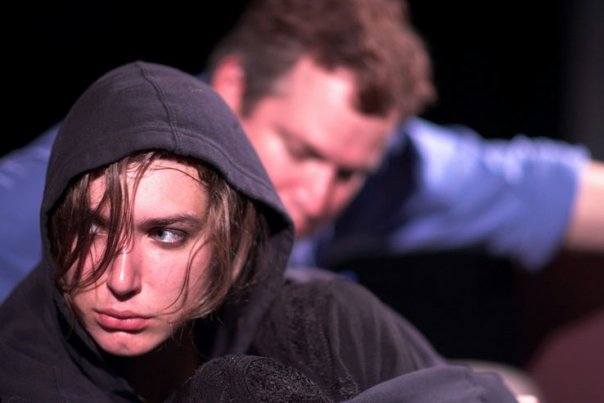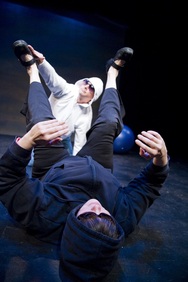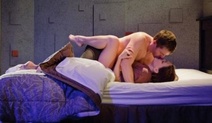|
Jacqueline Lawton: How long have you lived and worked as a playwright in DC? What brought you here? Why have you stayed?
Renee Calarco: I moved to DC in the mid-80s right after graduating from college with a degree in English and absolutely no job prospects. Amazingly, I found a job within a week, doing editorial assistant work for a teeny-tiny trade publication. I’d always been a writer and had done a little bit of theater…and I ended up falling in love with comedy improv after I moved here. I began learning, performing, and teaching improv and eventually realized that improv was essentially a kind of spontaneous playwriting. So in the late ‘90s I started writing ten-minute plays, then eventually full-lengths. The theater scene here just absolutely exploded (as did the improv scene). I loved it all so much that I had to stay! JL: Have you ever been a member of a DC area playwrights writing group? If so, did you find it useful? Would you recommend that other playwrights join them? RC: Up until recently, not really. I’m a very very bad (and lapsed) member of an online writing group. But I’ll be joining a group later on this fall, and am really looking forward to it. I need the friendly pressure and camaradarie of other playwrights! JL: In DC, we have the Capital Fringe Festival, the Intersections Festival, the Source Theatre Festival, the Kennedy Center's Page-to-Stage Festival, the Black Theater Festival, and the Hip Hop Theatre Festival. We also have the Mead Lab at Flashpoint Theater Lab Program. Have you participated in any of these? If so, can you speak about your experience? RC: I’ve had plays in (and have performed in) the Source Festival. It’s where I began to understand playwriting: how plays work, how they don’t work, and why it’s so important to write for an audience and not yourself. I’ve had plays (and performed in) Page-to-Stage, too. There’s no substitute for having a reading in front of an audience because you learn very quickly what the next revision will look like. JL: What kind of work do you do to pay the bills? How do you balance this work with your writing? RC: I’ve got a handful of part-time jobs. I teach improv and playwriting at the Theatre Lab; I teach playwriting at George Washington University; I do freelance writing; and I’m a licensed DC tour guide. It’s tough to balance sometimes, but it’s all working out (knock wood). For years and years, I did the 9-to-5 thing, which meant that I wrote primarily on the weekends and in the early mornings. Now that I’m essentially a full-time freelancer, I’m still figuring out my writing schedule. JL: How many plays have you had produced in the DC area? Were any of these plays self-produced? If so, where and what did you learn from that experience? RC: I’ve had two full-length productions: SHORT ORDER STORIES at Charter Theater and THE RELIGION THING at Theater J. I had a commissioned production of IF YOU GIVE A CAT A CUPCAKE at Adventure Theater. I’ve had a one-act and a handful of 10-minute productions at the Source Festival. JL: If you could be produced at any theatre in DC, which would it be and why? RC: Theater J—which has produced me! I love that it’s a writer’s theater with a fierce, contemporary (and political) point of view. I love the community outreach and programming. I love that Theater J produces women playwrights consistently. And shoot, I don’t think there’s a DC-based playwright out there who wouldn’t want to be produced at Arena Stage or Woolly Mammoth or Round House or Theater J or any other DC theater. JL: DC audiences are ... RC: Smart, opinionated, and incredibly supportive. And not shy about letting you know why your play works (or doesn’t). Passionate. JL: DC actors, designers and directors are .. RC: Serious geniuses at what they do. Also: inventive, collegial, generous…. JL: DC critics are ... RC: Not just for breakfast anymore? It’s great that there are now so many more critical voices being heard. There’s such a huge variety of voices. I think social media has changed the way audiences learn about shows, artists, and theaters in general, too. JL: How do you feel the DC theatre community has addressed the issues of race and gender parity ? How has this particular issue impacted you and your ability to get your work produced on the main stages? RC: We’re getting there, but slowly. It’s fantastic that we have Intersections and Fringe and the Black Theater Festival and the Hip Hop Theatre Festival—there’s clearly a demand for more diverse work and more experimental work. But DC has too many artists who aren’t being seen or heard. Which is why it’s great that Theater J has made a big commitment to DC-based writers, women playwrights, and playwrights of color. As have: Theater Alliance, The Hub Theatre, Pinky Swear, Forum… JL: What advice do you have for an up and coming DC based playwright or a playwright who has just moved to D.C.? RC: Go see a lot of plays. Join the DC Area Playwrights Facebook group. Take classes in acting, improv, and dance. Usher for shows. Basically: get out of the house! JL: What's next for you as a playwright? Where can we keep up with your work? RC: I’ve got a reading coming up at Page-to-Stage as part of the DC Playwrights Slam. Monday, Sept. 3 at 8pm in the Kennedy Center’s Terrace Theatre. And I’m working on a new play about religion and swindling. And there are a couple of other things in the works that aren’t quite final yet, but once they are, I’ll have the information up on my website: www.reneecalarco.com
0 Comments
Your comment will be posted after it is approved.
Leave a Reply. |
My BlogI'm a playwright, dramaturg, and teaching artist. It is here where you'll find my queries and musings on life, theater and the world. My posts advocate for diversity, inclusion, and equity in the American Theatre and updates on my own work. Please enjoy!
Categories
All
Archives
June 2020
Reading List
|



